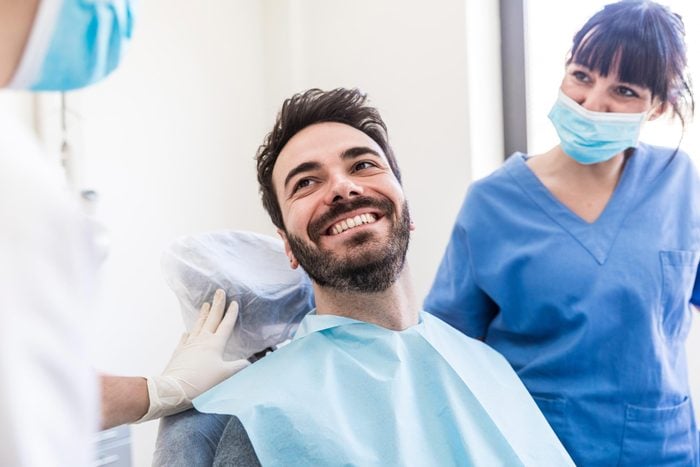
When you recline in the dental chair and open your mouth real wide, do you ever wonder what your dentist sees? Your mouth is a fascinating window into your overall health. Beyond merely identifying cavities or gum diseases, dental professionals are trained to detect many potential health concerns that start or manifest in your oral cavity.
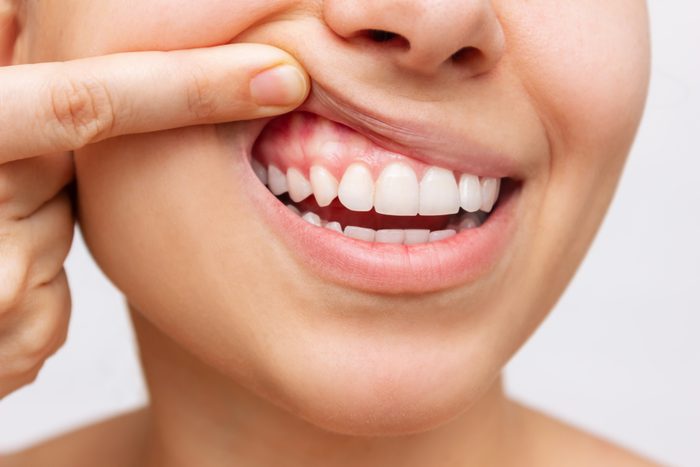
Gum disease and tooth decay
Dr. Jeffrey Sulitzer, Chief Clinical Officer with SmileDirectClub, explains that dentists initially look for signs of tooth decay or gum disease—such as dental cavities or swollen gums—especially at the point where the tooth meets the gum. “These cues often reveal poor oral hygiene,” Dr. Sulitzer says, including “improper brushing, lack of flossing, and/or a high-sugar diet.” Bad breath, bleeding gums, and canker sores also hint at poor oral health.
Your dentist also watches out for tooth erosion and discoloration. If the enamel, or the outer layer of your teeth, erodes, it might suggest issues like acid reflux or a diet high in acidic foods and beverages. “A frequent smoker will likely have staining, plaque buildup and tartar present,” Dr. Sulitzer points out. Moreover, he mentions that “dehydration can lead to white spots on the teeth, cavities and gum disease,” and a “diet high in sugars, starches and carbs can lead to gum disease, tooth loss, tooth decay and cavities.”
Contrary to the belief of many, brushing harder does not equate to cleaner teeth. “That is counterproductive,” Dr. Sulitzer warns. “The harder you brush, the enamel and gum tissue will experience more and more trauma, which is detrimental to oral health.”
He also debunks another widely held misconception about chewing gum as a substitute for brushing. “Chewing gum is not a replacement for brushing your teeth. This simply does not clean your teeth and gums in an effective way.” Ideally, he says, “You should brush your teeth after every meal.”
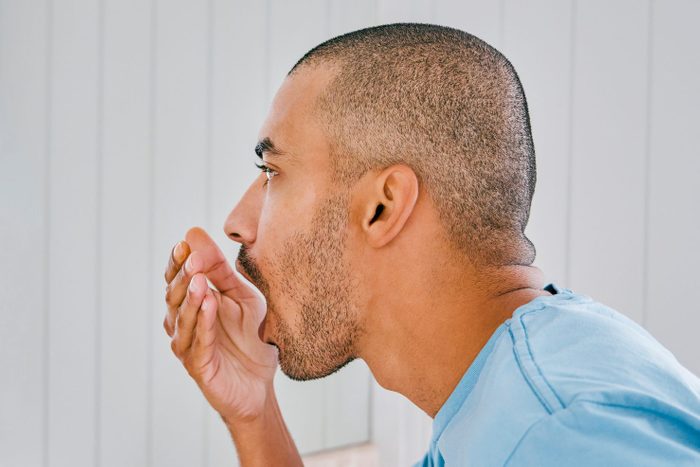
Bad breath
Bad breath isn’t just a social inconvenience—it’s a signal your dentist uses to detect potential health issues. A stubborn case of halitosis can signify more than just an affinity for garlic or onions. It’s often a symptom of a more persistent condition, most commonly periodontal disease. This bacterial infection can cause tooth loss if neglected.
It can also serve as a marker for issues affecting other body systems. Conditions such as respiratory tract infections, chronic sinusitis, and gastrointestinal problems can lead to halitosis. Additionally, poor oral hygiene, dry mouth, and certain medications can all contribute to chronic bad breath, further highlighting the importance of good dental hygiene.
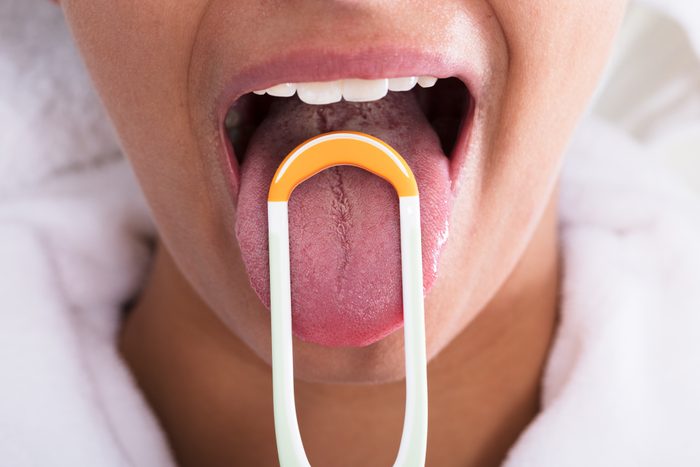
Tell-tale signs on the tongue
When examining your oral health, dentists do not just focus on your teeth and gums—they also examine your tongue for any signs of abnormalities. The tongue can indicate various underlying health conditions. A healthy tongue should be pink, sporting tiny projections known as papillae. Any deviations from this—color changes, texture shifts, or the presence of sores—can be clues to conditions like oral cancer, vitamin deficiencies, or fungal infections.
White Spots on Your Tongue? Health Experts Explain What They Could Mean
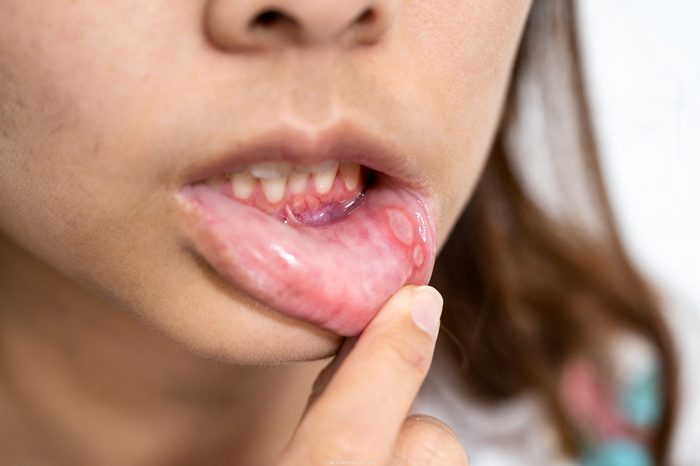
Spotting concerns through mouth sores and lesions
Mouth sores and lesions may cause discomfort but also serve as important health indicators. Your dentist always looks for canker sores, cold sores, and other potential oral lesions. Though they can be harmless, like signs of stress or food allergies, these symptoms can also point to severe conditions such as oral cancer. This makes the early identification of these signs an important aspect of your dental examination.
The American Academy of Oral Medicine (AAOM) strongly advocates that assessing risk factors for oral diseases, including oral and oropharyngeal cancers, should be a standard procedure. This should involve a non-invasive visual and tactile examination of the oral mucosa during initial and follow-up visits with oral health care providers. They recommend this practice for all patients.
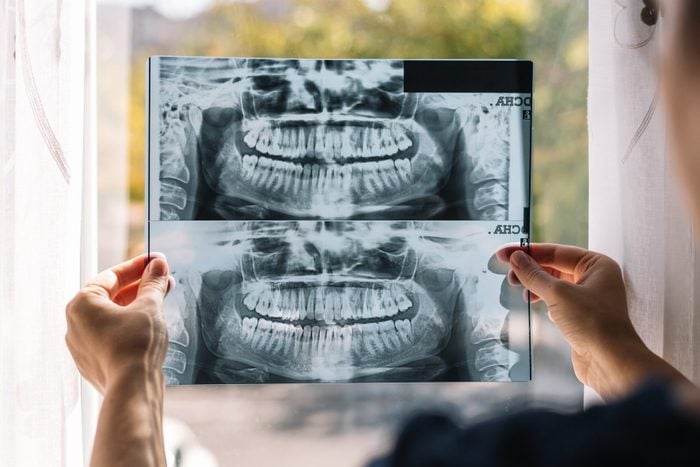
The importance of teeth and facial alignment
Proper teeth and facial alignment are integral to your oral health, extending far beyond mere aesthetics. When teeth and jaws are well-aligned, they function better, contributing to efficient eating, clear speech, and even proper breathing. They also facilitate better oral hygiene practices, as straight teeth are generally easier to clean, reducing the risk of cavities and gum disease.
Dr. Sulitzer highlights the unfortunate reality that not everyone has the same level of access to dental care, as indicated by statistics from the Centers for Disease Control & Prevention (CDC). He explains: “Adults with less than a high school education are almost three times as likely to have untreated cavities as adults with at least some college education.”
Further, about 40% of low-income or uninsured adults suffer from untreated cavities. Dr. Sulitzer states this group is “twice as likely to have one to three untreated cavities and three times as likely to have four or more untreated cavities” compared to those with higher incomes or dental insurance.
SmileDirectClub is a company working to eliminate this disparity in dental care access. Dr. Sulitzer shares their mission: To “make premium oral care more accessible, affordable, and convenient for everyone.” By removing barriers, organizations like this pave the way for underserved communities to improve their oral health…and perhaps smile a little bigger.
